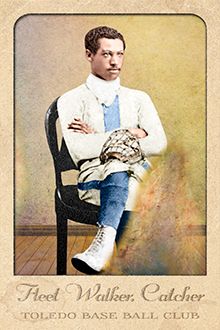- Series: Pioneer Portraits II: 1875-1899
- City: Toledo
- Team: Blue Stockings
- League: American Association
Moses Fleetwood Walker (1857-1924) was likely not the first African-American to play major league baseball. For that distinction, historians have made a case for William Edward White, who played a game with the Providence Grays on June 21, 1879. Subbing for injured first baseman Joe Start, Bill White hit a single in four at bats, stole two bases, scored a run and recorded 12 putouts without an error, contributing to a 5-3 win for the title-bound Grays and a 19 year old pitcher named John Montgomery Ward. By the next game, White had been replaced at the position by regular right fielder and Hall of Famer Jim O’Rourke, who continued to man first base until Start returned. The historic event established a one game career in the major leagues for Bill White that predates Fleet Walker’s appearance by five years.
Fleet Walker became the second African-American major leaguer when he played for the Toledo Blue Stockings of the American Association in 1884. Toledo’s star pitcher was Tony Mullane, who considered Fleetwood “the best catcher I ever worked with.” Sadly, Mullane succumbed to the bigotry of his own and his day and, despite the negative consequences his maladaptive behavior bequeathed his team, repeatedly crossed Walker up by ignoring his signs. Mullane’s dangerous deceit led to a series of injuries for Fleetwood, including a season ending broken rib. Despite the difficulties and indignities, Fleet hit .263 on the year, which was a few ticks higher than league average.
Toledo went 46-58 in 1884, finished 8th in the league and folded at the end of the season. The graceful and talented Walker returned to minor league ball in 1885 and, when his playing days were past, led a noble life as an inventor, author and educator.
- Moses’ brother, Weldy Wilberforce Walker joined him in Toledo mid-season, becoming the third and last black player in the major leagues until Jackie Robinson appeared 63 years later. Weldy got into five games, played the outfield and hit .222 in 18 plate appearances.
- Hank O’Day was Toledo’s other pitcher in 1884, going 9-28 with a 3.75 ERA in 327 innings. Mullane was clearly the ace, going 36-26 with a 2.52 ERA in 567 innings. Ars Longa alumni on the team: Tony Mullane, Hank O’Day, Curt Welch, Tom Poorman & Deacon McGuire.
- Playing with the Newark Little Giants in 1887, Fleet Walker caught George Stovey, perhaps the best African-American pitcher of the 19th century. It was the first African-American battery in non-segregated professional baseball history. Ars Longa alumni on the team: John Henry, Mickey Hughes, John Irwin & Tom McLaughlin.
- On April 7, 1887, Walker caught Stovey in an exhibition game against the New York Giants, losing 3-2 to Tim O’Keefe. The 1887 Giants were a 19th century juggernaut, featuring Keefe, John Montgomery Ward, Roger Connor, Buck Ewing, Mickey Welch & George Gore among a host of other excellent players. John Ward was so impressed by the battery (and by Stovey in particular) that he convinced manager Jim Mutrie to sign the two. Legend has it that Mutrie did make an attempt to purchase the players’ contracts, and it’s not entirely clear why the transaction failed to materialize, but later that year the Sporting Life reported that the Brooklyn Bridegrooms were also trying to purchase Stovey’s contract.
- Just one year later in 1888, Fleet joined the Syracuse Stars and formed non-segregated professional baseball’s second African-American battery with pitcher Robert Higgins. Higgins was great, going 17-7 with a 2.76 ERA en route to an International League title for Syracuse. Ars Longa alumni on the team: Billy Serad, Con Murphy, Frank Gilmore & Cupid Childs.
- Walker endured the venom of Reconstruction Era racism. He resorted to alcohol to soothe the rage and the pain, contributing to a downward spiral that left him in despair of racial reconciliation.
